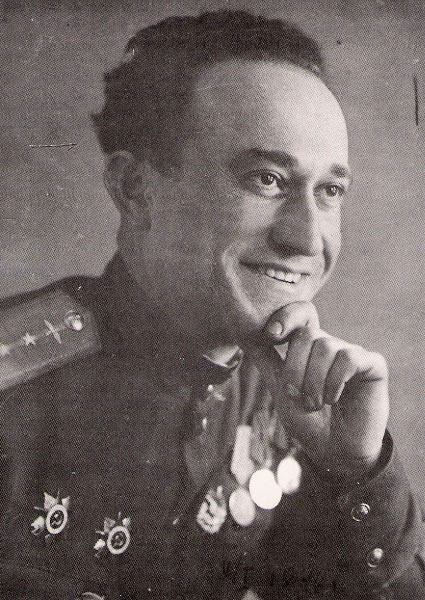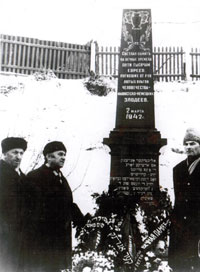Lev Ovsishcher was born in 1919 in the town of Bogushevsk, Belorussia. His father drove a horse-drawn carriadge. After he finished school in 1937, Lev began studying at the evening school of the Institute of Civil Aviation in Moscow. At the same time he worked as a mechanic for civilian planes. He was active in Soviet civic affairs as the Komsomol organizer of a Moscow aviation group. In October 1940 Lev Ovsishcher was drafted into the Red Army. He studied at an aviation school and then completed a course for the training of military commissars for air squadrons.
During the Soviet-German war, in November 1941 the group of PO-2 night bombers in which Lieutenant Ovsishcher was the commissar of a squadron was sent to the front. While also serving as a navigator, Ovsishcher took part in many nighttime bombing missions. While carrying out an assignment in October 1942, Ovsishcher was wounded. However, he soon got himself released from hospital and returned to his group.
Ovsishcher participated in the battle of Stalingrad. In January 1943 he carried out a special mission for the command of the Don Front. His plane was equipped with special radio equipment. During low-altitude night flights over the position of the surrounded German army commanded by General Paulus, Ovsishcher read out in German the terms for the capitulation of Paulus' troops. Ovsishcher's plane logged 24 such propaganda flights under heavy enemy fire. Ovsishcher later noted that the political administration of the front had nominated him for the honor of Hero of the Soviet Union but that the lower level army bureaucracy rejected this recommendation and he did not receive any medal at that time.
After the elimination of commissars in the Red Army in the spring of 1943, Ovsishcher was appointed head of the operational-intelligence unit of the headquarters of his group and, therefore, began participating less in bombing missions. In 1943 and 1944 he fought in Belorussia and Poland. During the war he was awarded the Orders of the Red Banner and of the Patriotic War, 1st and 2nd class.
During the same period Ovsishcher's brother Solomon served as an artillery officer and was awarded the Orders of the Red Banner and the Red Star.
After the war ended, in 1945 Lev Ovsishcher was sent to the Air Force Academy and, after graduating in 1950, he served in Georgia. His last post was chief of staff of a flight division. In 1961 Ovsishcher retired with the rank of colonel and moved to Belorussia. In Minsk he graduated from the evening school of the Institute of National Economics and then worked for various research institutions.
In 1971 Ovsishcher applied for an exit visa for Israel but his request was rejected. He was allowed to leave only in 1987, during Gorbachev's perestroika. For 16 years he led the life of a "refusenik," writing appeals to the Soviet authorities, taking part in refusenik demonstrations in Minsk and Moscow, and participating actively in memorial activity related to the Jews killed during the Holocaust. In the latter context he participated in meetings at the Iama (or Pit), one of the sites of the Nazi mass murders of the Jews of Minsk. For such unsanctioned activity Ovsishcher was reduced to the rank of private, deprived of his officer's pension, and expelled from the Communist Party, which he had joined in 1941.
Two other Jewish military figures, Colonel Efim Davidovich and Lieutenant-Colonel Naum Alshanskii, were active as Minsk refuseniks. They were also highly decorated veterans of the Great Patriotic War. Like Ovsishcher they were also stripped of their military ranks and deprived of their officers' pensions, Davidovich was even arrested. Among their fellow "refuseniks" this trio was referred to as "the three colonels."
In Israel Ovsishcher headed the council of Veterans of World War II. He was also named an honorary colonel of aviation of the Israel Defense Forces. Lev Ovsishcher died in Jerusalem in 2007.
Lev Ovsishcher's Memoir
In his memoirs Ovsishcher conveyed the antisemitic atmosphere that prevailed among some of his fellow officers during the Soviet "fight against cosmopolitanism" in 1948 and 1949. He described the disillusionment and pain that was felt by many Jewish officers who had fought against Nazism during the war. Some of these Jews had encountered antisemitism in the army and in the rear during the war itself; others had not. However, both groups noted how within a short time after the war previously existent anti-Jewish prejudices were reflected in official policy that was widely supported by the public, including those in uniform. Ovsishcher wrote:
"Once a lecturer from the Central Committee of the Communist Party came to the [military] academy to lecture on the burning topic of the day: 'The class and reactionary essence of cosmopolitanism'…. The hall was packed so full that people couldn't get in. People wanted to understand the meaning of what was going on….
An officer asked the lecturer the following question: 'Why are all the cosmopolitans Jews?'
The answer was as follows: 'The Jews, as a result of their ethnic qualities, of centuries of their way of life, and also of the historical conditions under which they lived cannot love our Homeland the way we Russians do!...'
On the second or third day after this I entered the dining hall to eat and sat down at a table where three places were already occupied by members of my class. They were talking about cosmopolitanism. Suddenly Hero of the Soviet Union Vasilenko, who was sitting opposite me, looked at me viciously and said:
'Where were they during the war when we were spilling our blood? And now so many of them have shown up at the academy!,' nodding in my direction…
I was taken aback. 'Do you mean me?' I asked with a quiver in my voice.
'All of you' was the sharp reply.
Those words struck me like a whip. Due to my surprise and the pain in my heart for some time I couldn't say a word. I had never heard such a thing. Barely able to control myself, I said quietly:
'At the front I fought no worse and, perhaps better than others and I know that my contribution to our shared victory was not less than yours even though you are a Hero [of the Soviet Union] while I was only awarded several decorations. But I also know that every one of my honors is worth more than your Star [as Hero of the Soviet Union] because, due to such antisemites like you, it was harder to earn. It's too bad that you learned nothing from the recent war except for the propaganda of Goebbels. That is understandable because it quite suits you.'
My opponent raged and used expressions that were insufferable. A flood of insults and antisemitic curses were directed at me.
I looked at the fellows sitting next to us, hoping that they would interfere and somehow try to make that hooligan see reason, but they said nothing….
The following day, at my request there took place a meeting of the Party bureau of our course…. Unfortunately, the incident was declared a simple argument 'in which both parties lacked restraint….'"
From Lev Ovsishcher, Vozvrashchenie (Return), Jerusalem, pp. 123-124.








